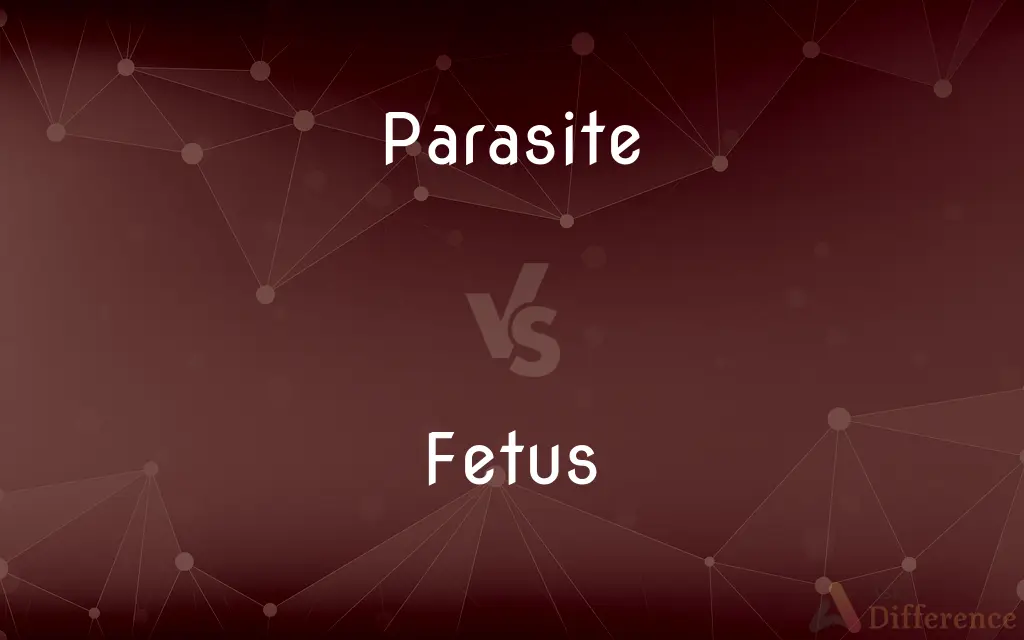Parasite vs. Fetus — What's the Difference?

Difference Between Parasite and Fetus
ADVERTISEMENT
Compare with Definitions
Parasite
(Biology) An organism that lives and feeds on or in an organism of a different species and causes harm to its host.
Fetus
|Image = Human Fetus2.jpg |Image_caption = Foetus A fetus or foetus (; plural fetuses, feti, foetuses, or foeti) is the unborn offspring of an animal that develops from an embryo. Following embryonic development the fetal stage of development takes place.
Parasite
One who habitually takes advantage of the generosity of others without making any useful return.
Fetus
The unborn young of a viviparous vertebrate having a basic structural resemblance to the adult animal.
Parasite
One who lives off and flatters the rich; a sycophant.
ADVERTISEMENT
Fetus
In humans, the unborn young from the end of the eighth week after conception to the moment of birth, as distinguished from the earlier embryo.
Parasite
A professional dinner guest, especially in ancient Greece.
Fetus
An unborn or unhatched vertebrate showing signs of the mature animal.
Parasite
(pejorative) A person who lives on other people's efforts or expense and gives little or nothing back.
Fetus
A human embryo after the eighth week of gestation.
The sequence is: molecules in reproductive systems, then gametes, zygotes, morulas, blastocysts, and then fetuses.
Parasite
(pejorative) A sycophant or hanger-on.
Fetus
The young or embryo of a vertebrate animal in the womb, or in the egg; often restricted to the later stages in the development of viviparous and oviparous animals. showing the main recognizable features of the mature animal, embryo being applied to the earlier stages.
Parasite
(biology) An organism that lives on or in another organism of a different species, deriving benefit from living on or in that other organism, while not contributing towards that other organism sufficiently to cover the cost to that other organism.
Lice, fleas, ticks and mites are widely spread parasites.
Fetus
An unborn or unhatched vertebrate in the later stages of development showing the main recognizable features of the mature animal
Parasite
A climbing plant which is supported by a wall, trellis etc.
Parasite
(historical) A retainer or companion of an ancient Celtic warrior, who praised him in song or poetry at gatherings; a bard.
Parasite
(aviation) A component of a composite aircraft which is carried aloft and air-launched by a larger carrier aircraft or mother ship to support the primary mission of the carrier.
Parasite
One who frequents the tables of the rich, or who lives at another's expense, and earns his welcome by flattery; a hanger-on; a toady; a sycophant.
Thou, with trembling fear,Or like a fawning parasite, obey'st.
Parasites were called such smell-feasts as would seek to be free guests at rich men's tables.
Parasite
A plant obtaining nourishment immediately from other plants to which it attaches itself, and whose juices it absorbs; - sometimes, but erroneously, called epiphyte.
Parasite
An animal which lives during the whole or part of its existence on or in the body of some other animal, feeding upon its food, blood, or tissues, as lice, tapeworms, etc.
Parasite
An animal or plant that lives in or on a host (another animal or plant); the parasite obtains nourishment from the host without benefiting or killing the host
Parasite
A follower who hangs around a host (without benefit to the host) in hope of gain or advantage
Share Your Discovery

Previous Comparison
Rocket vs. Satellite
Next Comparison
Artillery vs. Cannon















































